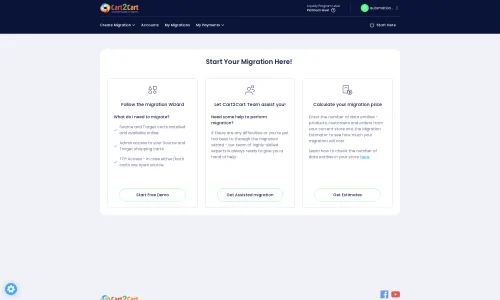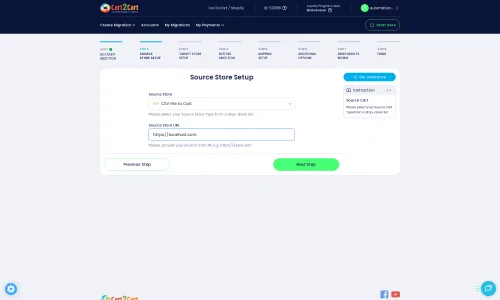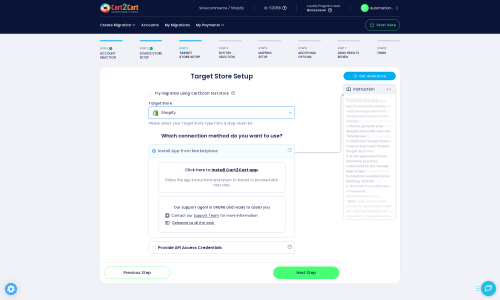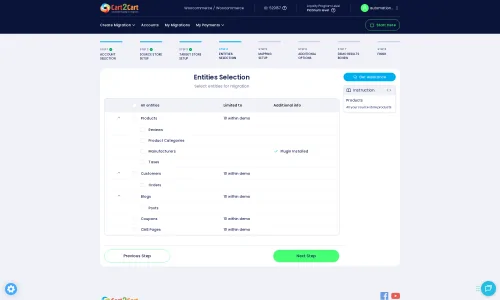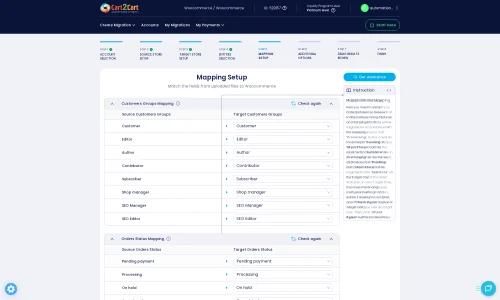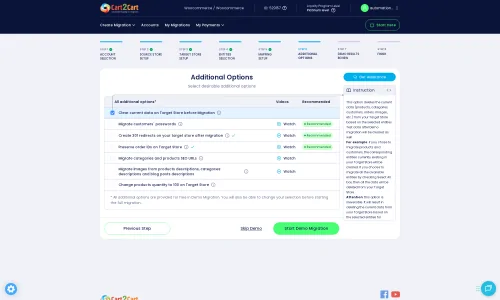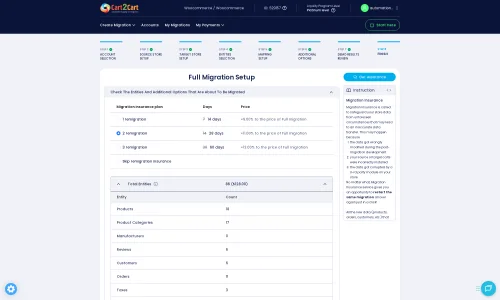Ebisumart to Shopify Migration - Step-by-Step Guide & Expert Services
Looking for seamless Ebisumart to Shopify migration? Cart2Cart simplifies how you move Ebisumart store to Shopify, guaranteeing a secure, lightning-fast transfer of all crucial data. Preserve your hard-earned SEO and experience zero downtime. Whether you’re ready to switch from Ebisumart to Shopify yourself with our detailed step-by-step guide, or prefer our expert team to handle the data transfer for you, trust us for your Ebisumart to Shopify migration.
What data can be
migrated from Ebisumart to Shopify
-
Products
-
Product Categories
-
Manufacturers
-
Customers
-
Orders
Estimate your Migration Cost
The price of your migration depends on the volume of data to migrate and the additional migration options you pick. To check the price for Ebisumart to Shopify conversion, click “Get estimates” and follow the suggested steps.
How to Migrate from Ebisumart to Shopify In 3 Steps?
Connect your Source & Target carts
Choose Ebisumart and Shopify from the drop-down lists & provide the stores’ URLs in the corresponding fields.
Select the data to migrate & extra options
Choose the data you want to migrate to Shopify and extra options to customise your Ebisumart to Shopify migration.
Launch your Demo/Full migration
Run a free Demo to see how the Cart2Cart service works, and when happy - launch Full migration.
Migrate Ebisumart to Shopify: A Complete Guide to E-commerce Replatforming
A Comprehensive Guide to Transitioning from Ebisumart to Shopify
Replatforming your e-commerce store is a strategic move that can unlock new growth opportunities, enhance scalability, and improve overall operational efficiency. If you're currently running your online business on Ebisumart and looking to transition to Shopify, you're choosing a platform renowned for its robust features, extensive app ecosystem, and user-friendly interface. This comprehensive guide will walk you through the entire process of migrating your store data from Ebisumart to Shopify, ensuring a smooth and successful transition.
As Ebisumart is not directly supported by standard automated migration tools, the migration process will involve exporting your data from Ebisumart into CSV files. These CSV files will then serve as your source data, allowing you to seamlessly import entities like products, customers, and orders into your new Shopify store using a specialized migration service or app.
Prerequisites for Migration
Before embarking on your migration journey, it's crucial to prepare both your existing Ebisumart store and your new Shopify environment. Proper preparation minimizes potential downtime, preserves data integrity, and ensures a seamless user experience for your customers.
- For Your Ebisumart (Source) Store:
- Data Export: Gain full administrative access to your Ebisumart backend to export all necessary data. You will need to export your products, product categories, customer records, orders, product reviews, and any other essential content (like CMS pages or blog posts) into CSV files. Each data entity should ideally be in its own structured CSV file. For more details on preparing your source store, refer to our guide on How to prepare Source store for migration?
- Data Review: Thoroughly review your Ebisumart data for accuracy and completeness. Clean up any redundant or outdated information before export.
- Backup Everything: Always create a full backup of your entire Ebisumart store data and database before initiating any migration steps.
- For Your Shopify (Target) Store:
- Shopify Account Setup: Create a new Shopify account or ensure your existing one is active. Choose a suitable Shopify plan (e.g., Basic Shopify, Shopify, Advanced Shopify, or Shopify Plus) that aligns with your business needs. Be aware that Shopify's 'Pause and Build' plan may block orders, so opt for an active plan during migration.
- Install Migration App: Shopify requires the installation of a migration app. The Cart2Cart Store Migration App is recommended to facilitate the data transfer. You'll install this directly from the Shopify App Store.
- Prepare for Reviews: If you plan to migrate product reviews, note that Shopify natively requires an app like AirReviews to manage them effectively post-migration. Plan to install a compatible reviews app on your new Shopify store.
- Disable Notifications: It's recommended to disable customer notifications during the migration process to avoid sending out confusing automated emails as new data is imported.
- Familiarize with Shopify: Take some time to understand Shopify's structure, including themes, apps, and settings. For more information on preparing your target store, visit How to prepare Target store for migration?
Performing the Migration: A Step-by-Step Guide
With your Ebisumart data prepared as CSV files and your Shopify store ready, you can now begin the migration using a migration wizard. For this guide, we'll outline the process as it would typically occur with a tool like Cart2Cart, which supports CSV file imports.
Step 1: Start Your Migration
Navigate to the migration service platform. This initial step will prompt you to begin the process, offering options for a DIY migration or assisted services.
Step 2: Connect Your Source Ebisumart Store via CSV
Since Ebisumart isn't directly listed as a supported platform, you will select 'CSV File to Cart' (represented as CsvToCart in the system) as your source shopping cart type. You will then upload the CSV files containing your Ebisumart data.
The system will parse these files to identify entities such as Products, Product Categories, Customers, Orders, Product Reviews, and other content you've exported.
Step 3: Connect Your Target Shopify Store
Next, select 'Shopify' as your target platform. You will be given options to establish the connection:
- Install App from Marketplace (Recommended): This is the simplest and most recommended method. Click the provided link to install the Cart2Cart Store Migration App directly from the Shopify App Store. Follow the on-screen instructions in Shopify, then return to the migration wizard.
- Provide API Access Credentials: As an alternative, you can choose to manually provide API access credentials. This involves creating a custom app in your Shopify admin, configuring the necessary API scopes (e.g., read_products, write_products, read_customers, etc.), and obtaining an Admin API access token. For detailed instructions on setting up API credentials, please refer to The Short & Essential Guide to Access Credentials for Cart2Cart.
Step 4: Select Data Entities to Migrate
This critical step allows you to specify exactly what data you want to transfer from your Ebisumart CSV files to Shopify. You can choose to migrate:
- Products (including SKUs, variants, descriptions, images)
- Product Categories
- Product Reviews
- Customers
- Orders
- CMS Pages
- Gift Cards, Coupons, Price Rules, Blogs, Blog Posts (if available in your CSV export)
Select 'All entities' for a comprehensive transfer, or pick individual items based on your needs.
Step 5: Configure Data Mapping and Additional Options
Here, you will fine-tune how your Ebisumart data translates to Shopify. This involves:
- Data Mapping: Match customer groups (e.g., 'Wholesale' from Ebisumart to a custom tag in Shopify), order statuses (e.g., 'Pending Payment' to Shopify's 'Pending'), and product attributes between your source CSVs and your target Shopify store. Proper data mapping ensures consistency and data integrity.
- Additional Options: Select various optional features to enhance your migration:
- Clear Target Store Data: Opt to clear current data on your Target store before migration if you're starting with a fresh Shopify installation.
- Preserve IDs: Choose to preserve original Order IDs, Product IDs, and Customer IDs to maintain historical data consistency.
- SEO URLs & 301 Redirects: Crucially, select options to preserve SEO URLs and create 301 redirects. This is vital for maintaining your existing SEO rankings and link equity from Ebisumart to Shopify.
- Migrate Images in Description: Ensure product and category images embedded in descriptions are transferred.
- Migrate Groups to Tags: Translate Ebisumart customer groups or product groups into Shopify tags.
Step 6: Run a Free Demo Migration (Recommended)
Before committing to the full migration, perform a free demo migration. This transfers a limited number of entities (e.g., 10 products, 10 customers, 10 orders) and allows you to:
- Verify data transfer accuracy.
- Check data mapping.
- Identify any potential issues or adjustments needed.
The demo is an invaluable step for ensuring data quality and a smoother full migration.
Step 7: Perform the Full Migration
Once you are satisfied with the demo results, proceed with the full migration. Review the total cost and consider adding a Migration Insurance Plan, which offers additional remigrations for a specified period, providing peace of mind. For more on this, see How Migration Insurance works?
Initiate the data transfer. The time required will vary depending on the volume of data being moved. You will receive notifications once the process is complete.
Post-Migration Steps
Completing the data transfer is a major milestone, but your work isn't over yet. Several crucial post-migration steps are necessary to ensure your new Shopify store is fully functional, optimized, and ready for customers.
- Verify Data Integrity: Thoroughly inspect your new Shopify store. Check product details (SKUs, variants, pricing, descriptions), customer accounts, order histories, images, and content pages to ensure everything has migrated correctly and appears as expected.
- Configure Shopify Storefront:
- Theme Customization: Choose and customize a responsive Shopify theme that reflects your brand identity.
- Install Essential Apps: Install any necessary Shopify apps for functionalities not natively available or to enhance your store (e.g., SEO apps, marketing tools, and the AirReviews app for product reviews).
- Payment Gateways & Shipping: Set up your preferred payment gateways (e.g., Shopify Payments, PayPal, Stripe) and configure shipping zones and rates.
- Implement 301 Redirects: If you didn't set up 301 redirects during the migration, it's crucial to implement them now. This ensures that any old Ebisumart URLs automatically redirect to their new Shopify counterparts, preventing broken links and preserving your SEO rankings and valuable link equity.
- Update DNS Settings: Point your domain's DNS records to your new Shopify store. This makes your Shopify site live and accessible to customers.
- Inform Customers: Announce your new store to your customer base. Highlight any new features or improvements.
- Conduct Thorough Testing: Perform extensive testing of all critical store functionalities: browsing products, adding items to the cart, the entire checkout process, customer account creation and login, search functionality, and contact forms. Ensure a smooth and intuitive user experience.
- Monitor Performance: After launch, continuously monitor your website traffic, sales, and SEO performance using analytics tools. Address any issues promptly to maintain optimal performance.
Migrating from Ebisumart to Shopify is a significant undertaking, but with careful planning and execution, it can lead to a more powerful and scalable e-commerce presence. By following this guide, you can ensure a successful transition, setting your business up for future success on Shopify.
Ways to perform migration from Ebisumart to Shopify
Automated migration
Just set up the migration and choose the entities to move – the service will do the rest.
Try It Free
Data Migration Service Package
Delegate the job to the highly-skilled migration experts and get the job done.
Choose Package

Benefits for Store Owners

Benefits for Ecommerce Agencies
Choose all the extra migration options and get 40% off their total Price

The design and store functionality transfer is impossible due to Ebisumart to Shopify limitations. However, you can recreate it with the help of a 3rd-party developer.
Your data is safely locked with Cart2Cart
We built in many security measures so you can safely migrate from Ebisumart to Shopify. Check out our Security Policy
Server Security
All migrations are performed on a secure dedicated Hetzner server with restricted physical access.Application Security
HTTPS protocol and 128-bit SSL encryption are used to protect the data being exchanged.Network Security
The most up-to-date network architecture schema, firewall and access restrictions protect our system from electronic attacks.Data Access Control
Employee access to customer migration data is restricted, logged and audited.Frequently Asked Questions
How long does it take to migrate my store from Ebisumart to Shopify?
Will my Ebisumart store go offline during migration to Shopify?
How can I prevent SEO ranking loss when migrating from Ebisumart to Shopify?
What data entities can be migrated from Ebisumart to Shopify?
What factors influence the cost of migrating from Ebisumart to Shopify?
Can customer passwords be migrated from Ebisumart to Shopify?
Can my Ebisumart store's design and theme be transferred to Shopify?
Is my Ebisumart store data secure during the migration to Shopify?
Should I use an automated tool or hire an expert for Ebisumart to Shopify migration?
How is data accuracy ensured during Ebisumart to Shopify migration?
Why 150.000+ customers all over the globe have chosen Cart2Cart?
100% non-techie friendly
Cart2Cart is recommended by Shopify, WooCommerce, Wix, OpenCart, PrestaShop and other top ecommerce platforms.
Keep selling while migrating
The process of data transfer has no effect on the migrated store. At all.
24/7 live support
Get every bit of help right when you need it. Our live chat experts will eagerly guide you through the entire migration process.
Lightning fast migration
Just a few hours - and all your store data is moved to its new home.
Open to the customers’ needs
We’re ready to help import data from database dump, csv. file, a rare shopping cart etc.
Recommended by industry leaders
Cart2Cart is recommended by Shopify, WooCommerce, Wix, OpenCart, PrestaShop and other top ecommerce platforms.



